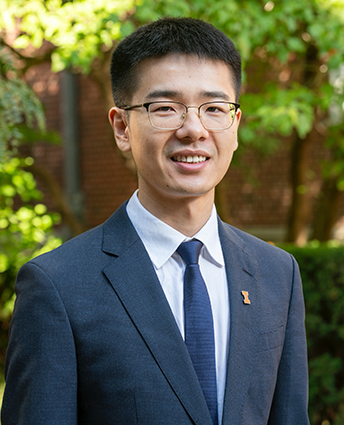Oct 10, 2023
The Power of Identity Cues in Text-Based Customer Service
This summer, an Indian startup company made international headlines when it announced it was replacing 90% of its support staff with a chatbot powered by AI. Summit Shah, founder and CEO of Dukaan, a Bangalore-based e-commerce company, said — or rather tweeted — that the chatbot was better because it could respond 98% faster than its employees. No doubt it was also a cost-saving move for the company, which dropped 23 employees off its payroll overnight. But was it a smart move?

Maybe not, according to Gies assistant professor Yang Gao.
In “The Power of Identity Cues in Text-Based Customer Service: Evidence from Twitter,” Gao and two coauthors explored the topic of online complaint management — and one company attempting to make it personal in an increasingly impersonal world.
On March 16, 2018, Southwest customer service representatives began including first names in all service responses made through Twitter. It wasn’t a major change. Just a small note to let customers know they were dealing with a person instead of an automated reply. But according to Gao, that small change made an impact.
As part of their study, Gao and his team reviewed posts made on the company’s official Twitter account before and after the signature experiment to see if they could detect any changes in customer service interactions, and they found that the signatures made a difference in two ways. First, customers were more willing to engage when posts contained a signature, and second, they were more likely to reach a resolution, showing the value of the human touch.
“People are always talking about how ChatGPT will change our lives and replace all human workers,” said Gao. “But actually, our findings suggest that it’s not true. At least in the customer service setting, customers still want to talk to human beings.”
If you’ve ever spent five minutes yelling “representative” into a phone, you get that.
Gao says that other companies are finding additional ways to provide that human connection, like asking employees to include links to personal profiles with their name, gender, and a brief bio. At the very least, Gao said that the Southwest signature experiment provides a cautionary tale for those firms looking to replace all of their customer service reps with AI.
Instead, his work indicates that the best path lies somewhere in between. A human-AI hybrid model could offer the best of both worlds — a person who can provide the human touch, and algorithm-drafted responses that can boost efficiency and effectiveness.
In a way, it was Gao’s personal search for a hybrid solution that led him to Gies. In May of 2021, Gao graduated from the Simon Business School at the University of Rochester with a PhD in Business Administration and began teaching at the School of Computing and Information Systems at Singapore Management University. It was a great job, close to his home and family. But there was just one problem.
“It wasn’t a business school, and most of my colleagues were from the computer science side,” said Gao. According to Gao, who has a passion for business applications, it was as if he were speaking a different language. “For example, they’d be talking about conferences, and I’d be talking about journal publications, so everything was different and also quite challenging for me.”
It was then he remembered a visit he’d made to the University of Illinois several years before to attend the graduation of a high school roommate. “At the time, I thought the university was very cool. It was very large, and it had a good reputation,” said Gao. So, he decided to visit the campus again last year — and liked everything he saw.
“All of the colleagues I met were super nice,” said Gao, adding that the overall atmosphere at Gies was supportive, which could lead to many interesting research collaborations.
There’s also the simple geographic advantage of living in the Midwest that’s often overlooked. From Singapore, it took Gao up to 18 hours to travel to any major US conference. Now, it’s a quick two- or three-hour flight, with easy connections from the university’s airport to any point in the country.
Last but not least, Gao said he was excited to teach Gies’ students, who have a reputation for being motivated and engaged. Gao hopes to channel that energy to teach students the computing skills they need to thrive in a changing world.
“Analytic skills nowadays are quite important, especially after the creation of ChatGPT, because now the writing is quite simple,” said Gao. “ChatGPT can help you code, but it’s become more important to learn how to program.”
Once they have the basic analytical skills and an appreciation for machine learning, it will be their call to decide how AI is incorporated into the companies where they work. Hopefully, they’ll make the right one.
